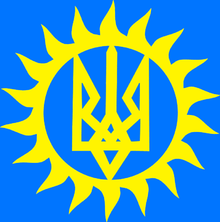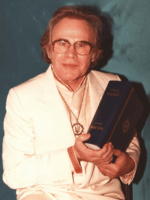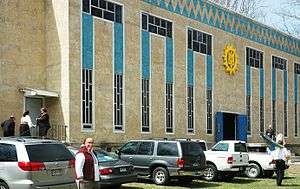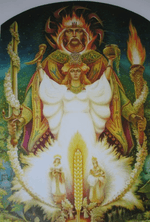Native Ukrainian National Faith
The Native Ukrainian National Faith (Ukrainian: Рі́дна Украї́нська Націона́льна Ві́ра, Rídna Ukrayíns'ka Natsionál'na Víra; widely known by the acronym РУНВі́ра, RUNVira) or Sylenkoism is a branch of the Slavic Native Faith (Rodnovery) specifically linked to Ukraine that was founded in the 1960s by Lev Sylenko (1921–2008) among the Ukrainian diaspora in North America. The doctrine of this tradition, and of the organisations which develop within it, revolves around a sacred writing composed by Sylenko himself, the Maha Vira ("Mighty Faith").[1]

| Part of a series on |
| Slavic Native Faith |
|---|
 |
|
Denominations Not strictly related ones:
|
|
Spread |
|
Sources
|
The Sylenkoite movement is distinctively monotheistic, and this, together with its early emphasis on the charismatic figure of the founder, has led other Ukrainian Rodnover movements and organisations to define it as not authentically "Rodnover". Members of Sylenkoite churches, however, consider themselves Rodnovers in all respects. Ivakhiv (2005) defines it as a "reformed" Slavic Native Faith.[2] It may be more accurately defined as pantheistic or panentheistic, since, in the Maha Vira, Dazhbog ("Giving God", the name that Sylenkoites use to refer to the supreme God) himself proclaims through his prophet: "I am the Giving God, I am in all things and all things are in me".[3]
According to the definition given by Sylenko himself, his doctrine is that of a solar "absolute monotheism".[4] Sylenko proclaimed himself a prophet, bringing to the Slavs a new understanding of God that, according to him, corresponds to their own and original understanding of God. By his own words: "God's grace came upon me, and following the will of God I have proclaimed a new understanding of God". According to believers, he acquired this knowledge through "breath of his ancestors" being united with them "by divine holiness".[5]
The movement is split between at least four churches which administer more than one hundred congregations spread throughout Ukraine. These four churches are: the "Association of Sons and Daughters of the Native Ukrainian National Faith" (OSID RUNVira), the "Association of Sons and Daughters of Ukraine of the Native Ukrainian National Faith" (OSIDU RUNVira), Volodymyr Chornyi's network, and the "Union of Native Ukrainian Faith" (SRUV).[6]
Maha Vira and the founder

The Maha Vira (literally "Great Faith") is the holy writing used within the organisations of the Sylenkoite movement. It was composed by Lev Sylenko himself in the 1960s as a synthesis of philosophical ideas relying upon historical and archeological sources. It includes a comparative lexicon of Sanskrit, Ukrainian and English language.[1]
The book tells the history of "Oryana-Scythia-Rus-Ukraine" over eleven thousand years, intertwined with theological and cosmological concepts. It identifies the Trypillian culture (3000–5000 BCE) as "Oryana" or "Orania", assumed to having been the epicentre of the Indo-Europeans or Aryans (whom the book calls Oryans, evoking a connection with the Ukrainian word for plowing, oraty;[1] cf. the same cognation in Latin, arare). According to the book, the white racial type and consequently European civilisation first developed along the banks of the Dnieper, and ancient Oryans-Ukrainians are credited as the initiators of the philosophy later written down in the Vedas, developed as the Oryans migrated in different directions including the north of the Indian subcontinent.[1]
Sylenko was a disciple of Volodymyr Shaian (1908–1974), the father of Rodnovery in Ukraine, and member of the religio-political anti-Soviet "Order of the Knights of the Sun God" (Orden Lytsariv Boha Sontsia) founded by Shaian in the 1940s. Sylenko was initiated into the group with the name Orlyhora ("Eagle Mountain"). By the 1970s, however, the links between the two had been severed, since Sylenko pursued his own reformation of the Slavic Native Faith which Shaian rejected.[7] Halyna Lozko, the leader of the "Federation of Ukrainian Rodnovers" (Объединение Родноверов Украины), which continues Volodymyr Shaian's orthodoxy, has advanced vehement critiques of Sylenkoism, calling Lev Sylenko a "false prophet" and accusing him of trying to lead Ukrainians into the "quagmire of cosmopolitan monotheism", the "fruit of Judaic religions which aim for global world domination".[8]
The early RUNVira organisation

.png)
The Native Ukrainian National Faith was founded by Lev Sylenko in the mid-1960s. Beginning in those years, groups were established among the Ukrainian diaspora. The first was in Chicago, in the United States, and later groups formed in Canada, Britain and Australia. Headquarters were set at the Temple of Mother Ukraine-Oryana, located in Spring Glen, New York, in the Catskill Mountains.[9]
The movement was introduced in Ukraine in the early 1990s, at the end of the Soviet Union. The first congregation was registered by the government in Kiev just in 1991. By the early 2000s, registered communities had grown to fifty and other tens were active throughout the country without formal registration.[9] The international Sylenkoite-RUNVira movement then split into at least four branches.[6]
Subsequent branchings
OSIDU RUNVira
Among Sylenkoite organisations, the "Associations of Sons and Daughters of Ukraine of the Native Ukrainian National Faith" (OSIDU RUNVira) is that which has maintained direct relationship with Sylenko, fully accepting him as prophet. As of the mid-2000s the organisations' leader was Bohdan Savchenko.[9] They consider themselves a transformed and completed Ukrainian Native Faith, focusing on the monotheistic belief in the impersonal Dazhbog (literally "Giving God"), the life-giving energy of the cosmos.[3]
Members of OSIDU RUNVira practise a weekly Holy Hour of Self-Realisation, which includes reading the Maha Vira, commentaries, sermons, ancestor worship, prayers and hymns, and ends with the singing of Ukraine's national anthem. Liturgical elements of the service include a chalice with water from a local river, a box or chest containing earth from sacred ground, candles, a copy of the Maha Vira, wheat-sheaves, herbs and flowers.[10]
OSID RUNVira

The "Association of Sons and Daughters of the Native Ukrainian National Faith" (OSID RUNVira) is the largest among Sylenkoite organisations. While recognising him as the founder of the movement, OSID RUNVira has rejected Lev Sylenko's ultimate authority and is currently led by a Holy Council presided by Bohdan Ostrovsky in Kiev. Ostrovsky was the founder of the first congregation of Native Ukrainian National Faith in Ukraine in 1991. OSID RUNVira controls the Temple of Mother Ukraine-Oryana in Spring Glen which the organisation took over by legal means in the late 1990s, after a dispute with OSIDU RUNVira over the ownership.[11]
Also OSID RUNVira members hold weekly Holy Hours, but these incorporate non-Sylenkoite elements such as readings of the Book of Veles or of Taras Shevchenko's national poetry. OSID RUNVira puts more emphasis than other Sylenkoite groups on calendrical celebrations, and their liturgy includes objects like the didukh (braided wheat-sheaf) and objects representing fire, water and earth. Ancestor worship is central, and festivals include de-Christianised holidays, such as the "Christmas of Dazhbog's Light" and the "Easter of the Eternal Resurrection", and holidays in honour of minor Slavic gods, Ukrainian heroes, the Slavs' supreme ancestor Or (otherwise spelled Ory, Ary, Yari, Yuri, and Yarilo), and others.[11]
Union of Native Ukrainian Faith
The "Union of Native Ukrainian Faith" (Собор Рідної Української Віри, Sobor Ridnoy Ukrainskoy Viry; SRUV) is another organisation of the Sylenkoite movement, more independent than the others from the original tradition. It was established in 1994 under the leadership of Oleg Bezverkhy, and has its headquarters in Vinnytsia. Besides Lev Sylenko, it relies upon the works of Shkavrytko, Kokriatsky, Orion, Lisovy and others.[12]
While retaining Sylenkoite monotheism, the SRUV promotes what it considers a more authentically Ukrainian theology with an emphasis on mysticism. They consider Podolia to be the heart of ancient Ukrainian-Oryan civilisation, being the place where remains of a large Scythian temple and the Zbruch Idol of Svetovid were found.[12]
See also
Sources
Citations
- Ivakhiv 2005, p. 12.
- Ivakhiv 2005, p. 16.
- Ivakhiv 2005, p. 18.
- Lesiv 2013, p. 130.
- Lesiv 2013, p. 134.
- Ivakhiv 2005, pp. 17–18.
- Ivakhiv 2005, p. 11.
- Ivakhiv 2005, p. 22.
- Ivakhiv 2005, p. 17.
- Ivakhiv 2005, p. 19.
- Ivakhiv 2005, pp. 19–20.
- Ivakhiv 2005, pp. 20–21.
References
- Ivakhiv, Adrian (2005). "In Search of Deeper Identities: Neopaganism and 'Native Faith' in Contemporary Ukraine" (PDF). Nova Religio: The Journal of Alternative and Emergent Religions. 8 (3): 7–38. JSTOR 10.1525/nr.2005.8.3.7. Archived from the original (PDF) on 14 February 2020.CS1 maint: ref=harv (link)
- Lesiv, Mariya (2013). "Ukrainian Paganism and Syncretism: 'This Is Indeed Ours!'". In Kaarina Aitamurto; Scott Simpson (eds.). Modern Pagan and Native Faith Movements in Central and Eastern Europe. Durham: Acumen. pp. 128–145. ISBN 9781844656622.CS1 maint: ref=harv (link)